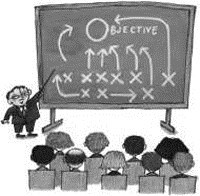
Congratulations. You have been chosen to help lead your community on a small governing council that will determine the major policy decisions affecting everyone who lives in your community. From finances to rules enforcement to selection of personnel and services, your voice will be a major factor in the way things are done. Although an unpaid office, being on the board of a community association can be a position of esteem, responsibility and leadership. Are you ready for this?
Step One
If you are feeling a bit unprepared for what lies ahead, you have just stepped into a pool that includes a vast majority of people who have never served on a community association board. Co-op/Condo Board Fundamentals (along with How to Avoid Internet Scams and The Athlete's Physique: How to Get Yours) was left out of the curriculum at most high schools.
Although the three "R's" do not include "Rules," as in community association governing documents, there are ways to get up to speed on your new responsibilities - including what they are and what they aren't.
The first step is to return to the governing documents themselves. You should have received them upon buying into the community, and even if you gave them the once-over back then, it is imperative that you read them again.
Bruce Anglin, on the board in his community association in Old Bridge, New Jersey, says that trying to find training can be a difficult process. "We put something together, called the 'Q&A' and we have someone on the board to introduce the new member and give them the packet of information. The original unit owners were supposed to have a book of bylaws and regulations, and sometimes the book is not passed on by the original owners, but that's why we have the packet to pass along."
One of the reasons that you may find a lack of resources on how to be trained for board service is that each particular community has its own particular way of governing itself. The only way to know the details for sure is to consult the paperwork, and as a new authority and administrator, it will behoove you to have a solid, first-hand knowledge of what they say.
"Each set of governing documents is different," says Curt Macysyn, executive vice president of the New Jersey chapter of the Community Associations Institute (CAI), "so there might be additional responsibilities. Each board operates in a manner that is tailored to its community. For example, some boards may have a liaison to the local government, while others may not."
Step Two
The next step is to contact the property manager and find out if they have any training materials or protocols for interacting with the board as a whole. This will also open a line of communication and may serve as an introduction to the organization that will be carrying out the day-to-day operations of the board's decisions.
"They may have procedures in place," says Macysyn, "especially with regard to finances, that would have to interface with the board at appropriate times. So, the property managers are a key component in the process."
Step Three
The next step is to attend board meetings, and begin interacting with other board members in a way that will allow you to glean insights into board operations. "There is a good reason for a mentoring process," says Macysyn. "I don't know that most boards are that formal, but it is a good idea."
Even if an actual process is not in place, taking the role of learner, early on, will allow you to witness what actually happens at every stage of the game. Fresh eyes are also better able to see the gaps in communication and may be able to offer new solutions to old problems.
Educational Opportunities
Fortunately, there are several options available for people who wish to further their knowledge of community association government, and a continuing education will strengthen any board.
The Steven L. Newman Real Estate Institute at Baruch College in New York City offers several applicable courses. One example, entitled "Co-ops and Condos" is taught by an attorney, and is specifically aimed at these types of issues and communities, says Barry Hersh, the institute's associate director of education. "Particularly condo boards are similar throughout. Co-op boards are more of a New York establishment."
Topics covered include the types of issues that board members are likely to face, and how to handle them, Hersh continues. "Management issues are the same, generally [in both condos and co-ops]: dealing with residents, dealing with vendors and contractors, etc."
"I think what we do is a little unusual," says Hersh. "And we get some people who are not from specific boards. Often brokers and salespeople want to understand how a board works too, so they are in this class as well."
CAI also offers a variety of courses that address many areas of interest and levels of experience. These include:
Level 1:Primer, an introduction to community associations
Level 2:Fundamentals, which covers basic operations and practical needs;
Level 3:Essentials, which is designed to strengthen leadership skills and general knowledge; and
Level 4:Selected Topics in Community Association Leadership, which provides in-depth study for people who wish to master certain community association skills, including building a community, conflict resolution and deed restrictions.
"Our chapter does this program every year, and the course is held on a Saturday, to make sure that people who are working and attending meetings in the evening can make it," says Macysyn.
Because the course offerings often do not coincide with board terms, early training will need to happen locally, within the community, says Hersh. "In practice, the new board members are trained by the other board members."
Hersh reiterates a worthwhile point for new board members and people who are still trying to get a handle on what is going on: "Start quiet and listen for a bit [before diving in.]"
Yet another educational resource is the Institute of Real Estate Management's (IREM) New Jersey chapter which, while primarily aimed at educating and certifying property managers, has an array of courses and seminars that new board members and veterans alike may find very helpful.
Non-management professionals - including HOA board members - can join IREM-NJ as "associate members," which gives them access to the same curriculum offered to managing agents looking to gain professional credentials. Courses being taught during the fall 2007 cycle include "Ethics for the Real Estate Manager," "Successful Site Management," and two different courses covering community asset management and finance. For the newly-minted board member who may have a lot of enthusiasm but not much on-the-job experience, courses like these could prove invaluable.
And don't forget about trade shows. The New Jersey Cooperator is holding its first ever Co-op & Condo Expo at the Meadowlands Exposition Center in Secaucus on May 14, 2008. The Expo, which mirrors the popular event The Cooperatorhas been running in New York for two decades, will feature nearly a hundred exhibitors, informative seminars and opportunities to network with the trade professionals and board decision-makers in the HOA community.
Resources
In addition to many books on the subject of board operations and service, many resources can be found online. If you are looking for specific information, the CAI website is a good place to start.
"CAI itself has what are called GAP: Guides for Association Practitioners," says Macysyn, "and they have been put online for the national site. They are small booklets that contain information for someone who has just become board president or treasurer, or someone who wants to know more about the bidding process or choosing a management company."
The CAI bookstore contains a complete library of titles that pertain to living in an association.
Keepers of the Peace
One topic of frequent debate is the enforcement of rules. People move to communities for a variety of reasons, and often what attracts them is the list of laws governing conduct. Noise complaints are a common issue in some communities, and when tempers flare, the board becomes a kicking board, as residents vent their frustrations to the governing authority.
"In terms of what I hear anecdotally, this is an issue where many people get tripped up," says Macysyn. "Solutions can be found in Be Reasonable, which is a book from CAI that goes through rules enforcement. It's important to find that balance between effectively enforcing the rules and overreaching, in terms of what is expected in the community."
Board or Manager?
One of the challenges that many new board members face early on is the distinction between responsibilities of the board versus the management company.
"I think the pitfall that most new board members fall into is taking it too personally," says Hersh. "In other words, they say 'Oh, I'm on the board now and I can take care of that for you,' but they can't. It's easy to get lured into issues that are not issues of the board."
Macysyn agrees: "It's a tough thing, because someone from the community may complain about something that is wrong and want the board to take care of it, but that is really the property manager's job, and people can confuse the roles of these two separate components of the community."
Advice from the Professionals
Keeping things in perspective is one of the best ways to make sure that the responsibility of being on a board does not become overwhelming, says Macysyn. "The one thing that we try to get across is that the board position is not a day-to-day responsibility. The board is there to agree to the policy decisions - the broader issues - rather than the everyday operations of the community."
As for the best way to train to serve on a board, "There is no one-size-fits-all approach," continues Macysyn. "Everybody runs for the board for a different reason, but there are areas where at least understanding and following other people's experiences will help along the way. The best teacher is experience, so the longer that you sit on the board and the more materials that you read, the better you will be at serving the community."
Denton Tarver is a freelance writer and a frequent contributor to The New Jersey Cooperator.






Leave a Comment